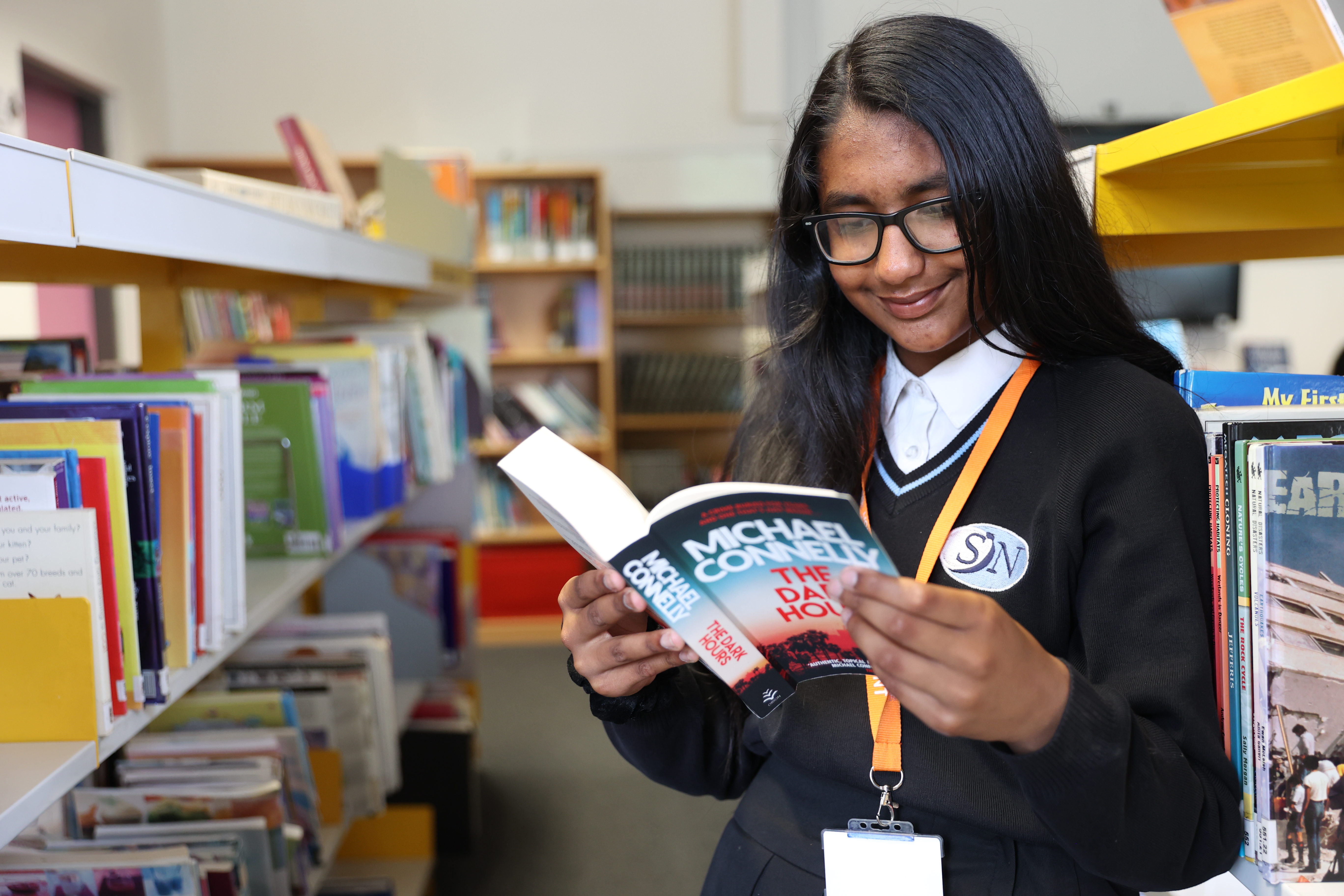
English
Our vision is to nurture a passion for reading in our students so they read for pleasure across a wide range of genres and different cultures, to communicate effectively, to think critically and to problem solve in a timely manner within an academically challenging and stimulating environment.Curriculum Rationale
Our vision is to nurture a passion for reading in our students so they read for pleasure across a wide range of genres and different cultures, to communicate effectively, to think critically and to problem solve in a timely manner within an academically challenging and stimulating environment.
Our curriculum is built on the understanding that skills are domain specific, which build upon those learnt by students at KS2. Our curriculum ensures that by the time students begin Key Stage 4 they have been taught two full novels; 3 full plays (including a Shakespeare tragedy and a comedy); the canonical, and influential contemporary poets; classical Greek and Anglo-Saxon epic narratives, and 6 complete short stories/novellas by canonical 19th century writers. Our curriculum, then, is grounded in breadth and diversity, because we believe that it is through secure foundational literary knowledge and experience that children develop the skills and the references to become instinctive readers and writers.
Curriculum Plan
| Year 7: Heroes and Villains/Myths and Legends | |||
| Text | The Ruby in the Smoke | Collection of epic poetry and classical narratives | A Midsummer Night’s Dream |
| Key retainable knowledge | What/How/Why and an analytical vocabulary | Heroic / epic traditions and idiomatic cultural references | Shakespearian Comedy and dramatic method |
| Core written assessment | Evaluative essay on characterisation | Analysing then writing and delivering a heroic speech | Extract to whole play analytical essay |
| Year 8: Social and Political Protest Writing | |||
| Text | The Curious Incident of the Dog in the Night-time (play) | 19th Century Short Stories | Social and Political Protest Poetry |
| Key retainable knowledge | Modern drama, dramatic method and didactic / political traditions | 19th Century genres, style and social and historical contexts | Poetic devices and genres and Canonical poets |
| Core written assessment | Thematic analytical essay | Mimicking of 19th century style narrative writing | Comparative essay on two poems (Hughes and Angelou) |
| Year 9: Aspects of Narrative and Literary Genres | |||
| Text | Djinn Patrol on the Purple Line | Macbeth or Romeo and Juliet (Depending on KS4 choice) | War Poetry Collection |
| Key retainable knowledge | Narrative methods and theory | Shakespearian tragedy and dramatic method | Poetic devices, war poetry as a genre, World War1 and World War 2 context |
| Core written assessment | Extract to wider story analytical essay under exam conditions | Article ‘How the modern world is a Shakespearian tragedy.’ | Two unseen war poems – single then comparative analysis |
Curriculum Assessment
Our students will have 6 written assessments a year – 3 of these are the formal end-of-topic assessment and three are based mid-way through the unit. In the summer term of years 7 and 8 we assess students orally. All of our students sit the same assessment at the same time, within reason. Our students also sit a ‘Knowledge Check’, twice a year, which assesses their knowledge twice a year. The ‘Knowledge Check is not content focused but skills based, and assesses students’ ability to understand the key areas of study that inform the curriculum. Questions cover vocabulary, inference, narrative voice and literary devices. As part of our metacognitive approach to learning, retrieval practice forms a routine part of daily lessons. This could include testing on the key retainable knowledge for current and previous units, or focussed on accompanying vocabulary.
The mid-term assessments and the end-of-topic assessments will be individually marked and the low stakes, retrieval testing self-marked in class.
EXTRA-CURRICULAR OPPORTUNITIES
Students are also encouraged to read fiction and non-fiction, listen to podcasts and visit the theatre more widely outside of college to enrich their cultural and social awareness of the world around them and their place within it. In addition, Year 9 students have the opportunity to take part in Literacy leaders where student leaders design starter activities and resources to deliver to younger year groups. And as part of our literacy strategy, students have the additional opportunity to participate in our ‘Study Buddies’ reading initiative, where older students read to younger students to enhance their reading for pleasure skills.
ESSENTIAL EQUIPMENT
Each student should bring a black and green pen to lessons as well as a ruler, pencil, and a rubber. A mini dictionary and thesaurus are desirable, but not essential, as each classroom comes equipped with dictionaries and thesauruses which are accessible to all.

